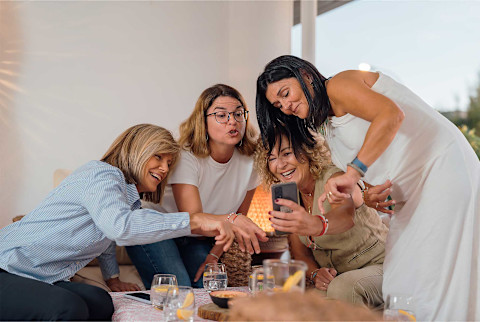
Wellness Starts with "We" — Especially for Women
Chip Conley, founder of the Modern Elder Academy, told me, "We tend to get very fixated on individual wellness, but interestingly, the word illness starts with an I, and wellness starts with a we." There's actually a medical term for the social aspect of health; it's called social fitness.
Conley shared another helpful way of thinking about it: "Community is a social safety net. We have property liability insurance for our home, but where's the emotional insurance for our personal rainy days?"
As we live longer, the need for stimulating social interactions and nourishing relationships becomes even stronger, particularly for women because we are more likely to live alone as we age. Once we reach 65, women in the U.S. are twice as likely to live alone than men, either because they've been widowed (due to superior longevity) or they have chosen to live solo. Either way, this can make women more vulnerable than men to the negative effects of isolation and loneliness.
Quality > quantity
That said, you don't have to be a social butterfly with hundreds of people in your circle. You also don't have to have a big group of best friends. While quantity matters somewhat, the depth of our relationships matters even more.
"It's nice to have a good mix of both strong and weak ties," Kelli Harding, psychiatrist, assistant professor of psychiatry at Columbia University Medical Center, and author of The Rabbit Effect, explained. That means the interactions you have when you go to the coffee shop or the grocery store or say hi to your neighbor who's down the street are little bits of daily connection that add up to something meaningful.
"I recommend to all of my patients that they be really intentional about developing those relationships across the board."
Helen Dennis, one of the pioneers in the field of aging, is a retirement coach, the syndicated columnist of "Successful Aging," and is herself in her 80s. She has been widowed for more than 20 years. When she speaks about relationships, she does so as both an expert and as a woman who actively works to build her own social network. She offers this advice:
"When it comes to relationships, I think it's important at this later lifestage that we learn to take the initiative. It takes practice because not everyone is a natural initiator." Ultimately, you want to try to have a diverse portfolio of relationships.
"Many of the studies that have been done around immune system functioning have shown that people who have a broader range of friendships actually fare better1," Harding says. However, while virtual connections can be helpful, they can't be everything.
"It's important to share physical space with people," Harding says, so that you can read their body language and do what psychologists call co-regulating—or matching our moods and emotions to the people around us, something we've done since infancy without perhaps being conscious of it.
Do a social inventory: Ask yourself, "Do I regularly talk to people during the day? Have I made time to connect with a loved one today?" If the answer is no to either of these questions, it's time to get out there, or, if you are homebound, invite folks in.
It's worth mentioning that if the people you are relating to don't make you feel accepted, supported, or safe—or their presence makes you feel stressed, judged, or unimportant—they are toxic.
While every relationship will have its ups and downs, if a relationship feels toxic, consider how to protect yourself by talking it through, minimizing your contact with that person, or ending the relationship altogether.
Kindness Fosters Social Fitness
Kindness is so powerful a health intervention that Harding says, "I wish I could prescribe kindness to all of my patients because it's one of those things where there's very little downside and a huge potential gain."
Giving kindness reduces cortisol, blood pressure, and premature causes of death. And it doesn't have to be a grand gesture or a lifetime of selfless service. Even small acts of kindness, or what Harding calls micro kindnesses, can have an impact.
These are things like making eye contact, smiling, reaching out to someone, offering a helping hand when you notice something, or stepping in when you see that somebody's in a hard situation. Not only do these simple acts benefit you, but they can also have a ripple effect.
"Studies show that when you do a small act of kindness, it inspires the person who's on the receiving end to do an act of kindness in return, and it also inspires whoever is watching the act of kindness to pay it forward," Harding shares.
Best of all, giving kindness costs nothing and doesn't take much time at all. I've included more on micro kindnesses in the hacks section of this chapter so that you can start incorporating it—and reaping the benefits—right away.
Excerpted with permission from Ageless Aging by Maddy Dychtwald, Mayo Clinic Press, May 2024.
